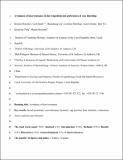Files in this item
Avoidance of host resistance in the oviposition-site preferences of rose bitterling
Item metadata
| dc.contributor.author | Rouchet, Romain | |
| dc.contributor.author | Smith, Carl | |
| dc.contributor.author | Liu, Huanzhang | |
| dc.contributor.author | Methling, Caroline | |
| dc.contributor.author | Douda, Karel | |
| dc.contributor.author | Yu, Dan | |
| dc.contributor.author | Tang, Qionying | |
| dc.contributor.author | Reichard, Martin | |
| dc.date.accessioned | 2018-06-10T23:38:49Z | |
| dc.date.available | 2018-06-10T23:38:49Z | |
| dc.date.issued | 2017-10 | |
| dc.identifier | 250227638 | |
| dc.identifier | 3f96ffdd-fc36-4e44-b5af-1ad04230ad11 | |
| dc.identifier | 85020690765 | |
| dc.identifier | 000410764000012 | |
| dc.identifier.citation | Rouchet , R , Smith , C , Liu , H , Methling , C , Douda , K , Yu , D , Tang , Q & Reichard , M 2017 , ' Avoidance of host resistance in the oviposition-site preferences of rose bitterling ' , Evolutionary Ecology , vol. 31 , no. 5 , pp. 769-783 . https://doi.org/10.1007/s10682-017-9907-2 | en |
| dc.identifier.issn | 0269-7653 | |
| dc.identifier.other | ORCID: /0000-0003-3285-0379/work/47136182 | |
| dc.identifier.uri | https://hdl.handle.net/10023/13872 | |
| dc.description | Funding came from the Czech Science Foundation (13-05872S). | en |
| dc.description.abstract | A contemporary outcome of dynamic host–parasite coevolution can be driven by the adaptation of a parasite to exploit its hosts at the population and species levels (parasite specialisation) or by local host adaptations leading to greater host resistance to sympatric parasite populations (host resistance). We tested the predominance of these two scenarios using cross-infection experiments with two geographically distant populations of the rose bitterling, Rhodeus ocellatus, a fish brood parasite of freshwater mussels, and four populations of their mussel hosts (two Anodonta woodiana and two Unio douglasiae populations) with varying degrees of geographic sympatry and local coexistence. Our data support predictions for host resistance at the species level but no effect of local coexistence between specific populations. Rhodeus ocellatus showed a preference for allopatric host populations, irrespective of host species. Host mussel response, in terms of ejection of R. ocellatus eggs, was stronger in the more widespread and abundant host species (A. woodiana) and this response tended to be higher in sympatric populations. These outcomes provide support for the importance of host resistance in bitterling oviposition-site decisions, demonstrating that host choice by R. ocellatus is adaptive by minimizing egg ejections. These findings imply that R. ocellatus, and potentially other bitterling species, may benefit from exploiting novel hosts, which may not possess appropriate adaptive responses to parasitism. | |
| dc.format.extent | 15 | |
| dc.format.extent | 625255 | |
| dc.language.iso | eng | |
| dc.relation.ispartof | Evolutionary Ecology | en |
| dc.subject | Brood parasitism | en |
| dc.subject | Coevolutionary dynamic | en |
| dc.subject | Egg ejection | en |
| dc.subject | Host selection | en |
| dc.subject | Oviposition choice | en |
| dc.subject | Parasite specialisation | en |
| dc.subject | QL Zoology | en |
| dc.subject | DAS | en |
| dc.subject.lcc | QL | en |
| dc.title | Avoidance of host resistance in the oviposition-site preferences of rose bitterling | en |
| dc.type | Journal article | en |
| dc.contributor.institution | University of St Andrews. School of Biology | en |
| dc.contributor.institution | University of St Andrews. Marine Alliance for Science & Technology Scotland | en |
| dc.contributor.institution | University of St Andrews. Scottish Oceans Institute | en |
| dc.identifier.doi | 10.1007/s10682-017-9907-2 | |
| dc.description.status | Peer reviewed | en |
| dc.date.embargoedUntil | 2018-06-10 |
This item appears in the following Collection(s)
Items in the St Andrews Research Repository are protected by copyright, with all rights reserved, unless otherwise indicated.

